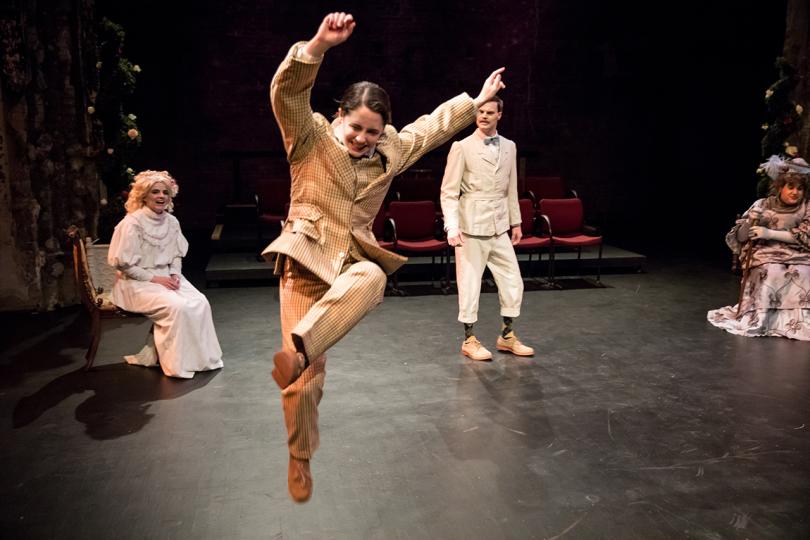Clowns in Conservatory

Oscar Wilde’s The Importance of Being Earnest has been beloved by audiences worldwide since its debut in 1895, in large part because it’s often seen to be harmless: its parody of Victorian culture is prescient but not cutting, and its comedic structure allows the audience to enjoy sans angst or complicity. But as critic Kenneth Krauss notes in his introduction to the text, such an understanding quite misses the point: “beneath the superficial brilliance, Wilde manages to create a subtle interplay of ironies that add up to more than the wit so prominently on display.” In other words, done well, it’s a play that provokes and unmasks the pretensions that uphold society’s hypocritical inequality—which is perhaps, more than laughter, the true purpose of satire.
Four Humors wouldn’t be my first choice for the job, being as they specialize in physical comedy, clowning, and sometimes-racy adaptations and original works. Their ribald version of Lolita, a Fringe favorite, featured the hairy, male Brant Miller as a ten-year-old girl (funny, but problematic - “ha-ha! look at that man acting like a girl!”) Miller returns in Earnest in the legendary role of Lady Bracknell, though not in cross-dressing jest: he plays her straight on (and exquisitely well). The whole production is, in fact, straight-on, for Four Humors: the actors, in ruffles, trains and wool suits, stick mostly to the text. Musicians Amanda Verstegen and Anna Weggel-Reed provide gentle accompaniment, with pauses and key changes that playfully mirror the witty wordplay on stage.
The play revolves around two vapid young aristocrats, Jack Worthing (Christian Bardin) and Algernon Moncrieff (Ryan Lear), in their attempts to win the hands of Gwendolen Fairfax (Brighid Burkhalter) and Cecily Cardew (Emily Wrolson). Gwendolen’s mother, Lady Bracknell, dismisses Jack, who is known in London not as Jack but as “Earnest,” which enables him to live a double life: “Jack” keeps a respectable weekday home in the country, while “Earnest” lolls indulgently in the city on the weekend. Algernon has a similar ploy, a made-up friend called “Bunbury,” whose frequent “illnesses” allow Algy to skip out on more tedious social obligations. As they chase the ladies, their double-lives are unmasked. Thank you, Shakespeare; cue hilarity.
Like most Wilde scripts, Earnest leans on language-play and a tight plot. 4H’s physical comedy chops lead to good slapstick, but more often here it’s used to vary dialogue pace and to delineate character. Much of the banter belongs to Algernon and Jack, who keep it light and silly. One wonders whether the actors could have found more subtle notes, perhaps something sinister; is there not a shadow side to upper-class hedonism? Their airiness is balanced by Brant’s hefty physicality, and his raspy, langorous voice as Lady Bracknell. And Brighid Burkhalter’s ice-cold Gwendolyn contrasts nicely with Jack’s wild attempts at winning her affection.
As Jack, Christian Bardin is an absolute delight. Striding and sliding around the stage, she calls to mind a mix between Alfalfa and Steve Martin, finding many layers of desperation (at one time even hiding between Gwendolyn’s legs), and always bouncing back with yet more naive optimism. The text’s dense and antiquated verbiage is a challenge for any actor; Bardin, though, delivers it precisely and with ease. Brant Miller does too, but too often the other actors’ speech feels belabored. When the language loses steam, Wilde’s wit falls flat, and Gwendolyn’s boredom is suddenly understandable.
When the play drags like this, the actors rely heavily on direct address and gesture. Iris Rose Page and Matt Spring, as Miss Prism and the Reverend, are under-age in their casting, and their relationship lacks the repressed sexual charge called for by their innuendo-laced dialogue. The relationship between Cecily and Algernon does the work the plot calls for, but the moral implications in the characters’ age gap are left open. In general, Algernon’s wickedness goes largely unexplored.
The program notes, “when we laugh, our mind is cleared and we are able to see our problems with fresh eyes,” and you can always count on Four Humors for at least some good laughs. In new territory with a text-heavy classic, they’re not at their strongest, but I say good on you, Four Humors, for taking the leap. We might have to wait for the next Wilde production to experience satire’s higher purposes, but it’s well worth your evening to watch a few young, solid performers take on tough material with a group of seasoned comedians.


